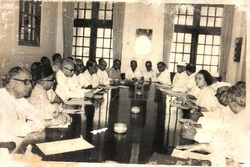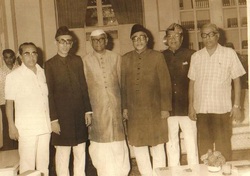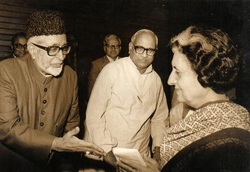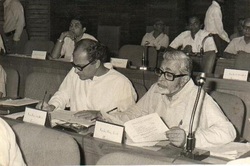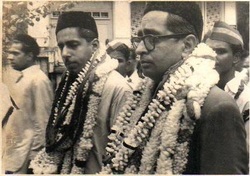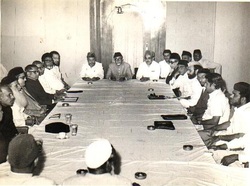Member of Parliament
1960-1966: Member of Rajya Sabha (Upper House of Indian Parliament)1967-1996: Member of Lok Sabha (Lower House of Indian Parliament) for seven consecutive terms
1967-1972: Calicut Parliamentary Constituency
1972-1977: Calicut Parliamentary Constituency
1977-1980: Manjeri Parliamentary Constituency: with 61.27% of votes
1980-1984: Manjeri Parliamentary Constituency: with 53.61% of votes
1984-1989: Manjeri Parliamentary Constituency: with 50.90% of votes
1989-1991: Ponnani Parliamentary Constituency: with 49.84% of votes
1991-1996: Ponnani Parliamentary Constituency: with 53.08% of votes
During this period, Ebrahim Sulaiman Sait served as member of various parliamentary committees such as Estimates Committee, Standing Committee on Foreign Affairs, Select Committee on Plantation Labor, and others.
He has also visited Afghanistan, Iran, Turkey, Lebanon, Switzerland, United Kingdom, United States of America with parliamentary delegation.
1967-1972: Calicut Parliamentary Constituency
1972-1977: Calicut Parliamentary Constituency
1977-1980: Manjeri Parliamentary Constituency: with 61.27% of votes
1980-1984: Manjeri Parliamentary Constituency: with 53.61% of votes
1984-1989: Manjeri Parliamentary Constituency: with 50.90% of votes
1989-1991: Ponnani Parliamentary Constituency: with 49.84% of votes
1991-1996: Ponnani Parliamentary Constituency: with 53.08% of votes
During this period, Ebrahim Sulaiman Sait served as member of various parliamentary committees such as Estimates Committee, Standing Committee on Foreign Affairs, Select Committee on Plantation Labor, and others.
He has also visited Afghanistan, Iran, Turkey, Lebanon, Switzerland, United Kingdom, United States of America with parliamentary delegation.
When Sait sahib was a Member of Parliament, he also served the community in various other capacities:
1960-1965: Member, Kerala Wakf Board
1965-1975: Chairman, Kerala Wakf Council
1965-1975, and 1985-1995: Member, Central Wakf Board
Member, Central Wakf Board
1962-2005: Chairman, Tirurangadi Muslim Orphanage Managing Conmmittee
1965-1967: General Secretary, All India Palestine Conference
1970-1975: Member, Haj Advisory Board
1975-1977: Member, Central Haj Committee
1972-2005: Founder Member, and Executive Committee Member, All India Muslim Personal Law Board
1964-2005: Founder and Executive Committee Member, All India Muslim Majlis-e-Mushavrath
1968-1971: General Secretary All India Muslim Mushavarath
1984-1990, & 2001-2005: Member, Aligarh Muslim University Court
1989-1993: Director, Muslim Printing and Publishing Company, Calicut
1991-1993: Member, National Integration Council
1960-1965: Member, Kerala Wakf Board
1965-1975: Chairman, Kerala Wakf Council
1965-1975, and 1985-1995: Member, Central Wakf Board
Member, Central Wakf Board
1962-2005: Chairman, Tirurangadi Muslim Orphanage Managing Conmmittee
1965-1967: General Secretary, All India Palestine Conference
1970-1975: Member, Haj Advisory Board
1975-1977: Member, Central Haj Committee
1972-2005: Founder Member, and Executive Committee Member, All India Muslim Personal Law Board
1964-2005: Founder and Executive Committee Member, All India Muslim Majlis-e-Mushavrath
1968-1971: General Secretary All India Muslim Mushavarath
1984-1990, & 2001-2005: Member, Aligarh Muslim University Court
1989-1993: Director, Muslim Printing and Publishing Company, Calicut
1991-1993: Member, National Integration Council
The reason for Ebrahim Sulaiman Sait's continuous success at the elections and elevation to high posts of authority is simple: More than anything else, power, money or fame, he loved his people. He admired the principles that made up his political vision.
Sait sahib spoke with powerful eloquence both in Urdu and English, and his speeches are famous both inside and outside Parliament. He was found of Urdu poetry and literature, and used to always quote poems of Allama Iqbal and others. He used to quote the relevant Quranic ayahs suitable for the occasion. He used to prepare extensively for any speech, referring to many books and preparing notes.
Thousands of common people gathered to hear his speeches in his constituency in Kerala, though the people there did not know English or Urdu. With respectful and patient silence, they listened to his emotional volcano. Though he always enjoyed eminent translators, the audience never seemed to be in need of them to understand the exploding words that Sait sahib said. Sometimes he literally broke into tears in front of huge gatherings while speaking about the poor and helpless victims of the riots in north India. When he stood on the dais with uncontrollable streams of tears on his cheeks, many of his followers also used to cry. He was a legend in his own lifetime.
Ebrahim Sulaiman Sait truly understood that with great power comes great responsibility. He reposed the trust people bestowed upon him by playing an active role in all issues that touched the lives of the Muslim community, which include all issues that mattered to the secular and pluralistic life of Indian democracy. His major achievements include fighting to retain the minority status of Aligarh Muslim University, and pressurizing the Center to bring out Shariah Protection Bill after the Shah Banu verdict. Ebrahim Sulaiman Sait also took pains In other major issues of the times such as Jamia Millia Islamia, Babri Masjid, TADA and the seven year-long imprisonment of Abdul Nasser Madani, and much more.
During the notorious Emergency, when his colleagues in the Muslim League were arrested and tortured, Sait sahib protested boldly. In Delhi, the League leader Iqbal Ahmed Kustiwala and many activists were arrested. Some of their relatives came to Sait sahib and pleaded for his interference. Sait sahib spoke to the Congress President Mr. D. V. Barua over phone and asked for an appointment. The next morning Sait sahib met Barua and plainly asked to arrest him too. It was surprising for the Congress leader. "You’ve arrested my party members and let me free. This is not fair," was Sait’s comment. Barua took him to the then Prime Minister Indira Gandhi to whom Sait sahib bluntly said: "I want to get arrested. I am against the Emergency and compulsory sterilization." Indira knew the power this man had inside. After two days Sait sahib received a phone call from the Prime Minister’s Additional Private Secretary, Mr. R. K. Dhawan, telling him that he could come to the jail and get all his colleagues released. When the Jamat-e-Islami and Students Islamic Movement of India were banned, his was the strongest and most repeated protest demanding the reversal of the government decision.
Sait sahib spoke with powerful eloquence both in Urdu and English, and his speeches are famous both inside and outside Parliament. He was found of Urdu poetry and literature, and used to always quote poems of Allama Iqbal and others. He used to quote the relevant Quranic ayahs suitable for the occasion. He used to prepare extensively for any speech, referring to many books and preparing notes.
Thousands of common people gathered to hear his speeches in his constituency in Kerala, though the people there did not know English or Urdu. With respectful and patient silence, they listened to his emotional volcano. Though he always enjoyed eminent translators, the audience never seemed to be in need of them to understand the exploding words that Sait sahib said. Sometimes he literally broke into tears in front of huge gatherings while speaking about the poor and helpless victims of the riots in north India. When he stood on the dais with uncontrollable streams of tears on his cheeks, many of his followers also used to cry. He was a legend in his own lifetime.
Ebrahim Sulaiman Sait truly understood that with great power comes great responsibility. He reposed the trust people bestowed upon him by playing an active role in all issues that touched the lives of the Muslim community, which include all issues that mattered to the secular and pluralistic life of Indian democracy. His major achievements include fighting to retain the minority status of Aligarh Muslim University, and pressurizing the Center to bring out Shariah Protection Bill after the Shah Banu verdict. Ebrahim Sulaiman Sait also took pains In other major issues of the times such as Jamia Millia Islamia, Babri Masjid, TADA and the seven year-long imprisonment of Abdul Nasser Madani, and much more.
During the notorious Emergency, when his colleagues in the Muslim League were arrested and tortured, Sait sahib protested boldly. In Delhi, the League leader Iqbal Ahmed Kustiwala and many activists were arrested. Some of their relatives came to Sait sahib and pleaded for his interference. Sait sahib spoke to the Congress President Mr. D. V. Barua over phone and asked for an appointment. The next morning Sait sahib met Barua and plainly asked to arrest him too. It was surprising for the Congress leader. "You’ve arrested my party members and let me free. This is not fair," was Sait’s comment. Barua took him to the then Prime Minister Indira Gandhi to whom Sait sahib bluntly said: "I want to get arrested. I am against the Emergency and compulsory sterilization." Indira knew the power this man had inside. After two days Sait sahib received a phone call from the Prime Minister’s Additional Private Secretary, Mr. R. K. Dhawan, telling him that he could come to the jail and get all his colleagues released. When the Jamat-e-Islami and Students Islamic Movement of India were banned, his was the strongest and most repeated protest demanding the reversal of the government decision.
